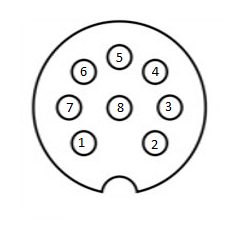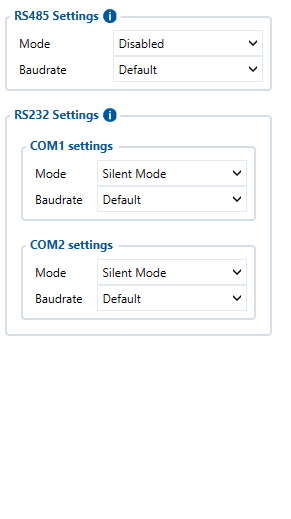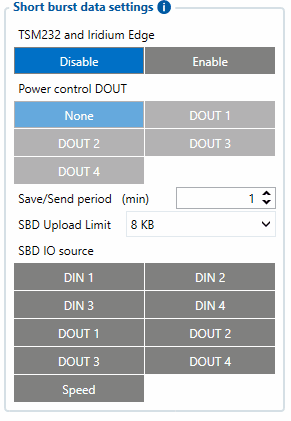Difference between revisions of "Template:FMX640 Short Burst Data"
(→Se) |
|||
| Line 140: | Line 140: | ||
|} | |} | ||
===Setting up Alarm priority records=== | ===Setting up Alarm priority records=== | ||
| − | In addition, you can select which IO element can generate Satellite records. In order to do that you need to go to the IO tab select IO record priority Panic what you want to get that data through satellites if there is no GSM connection. | + | In addition, you can select which IO element can generate Satellite records (Alarm priority). In order to do that you need to go to the IO tab select IO record priority Panic what you want to get that data through satellites if there is no GSM connection. |
| + | |||
In the scenario shown in the above picture when a panic record is made (generated by Digital Input 1 or Digital Input 2) internal 90 seconds timer will start to tick and if that timeout device will not send a record through the GPRS network it will be sent with Iridium satellites. | In the scenario shown in the above picture when a panic record is made (generated by Digital Input 1 or Digital Input 2) internal 90 seconds timer will start to tick and if that timeout device will not send a record through the GPRS network it will be sent with Iridium satellites. | ||
Revision as of 13:37, 5 September 2022
Introduction
Since 00.02.05 firmware version device supports Iridium devices which can send short burst data (SBD) to the server. This means that some data can be sent from the FM device to the server through satellites. From firmware version - 01.02.22.Rev.02, support for Iridium Edge is added. Iridium Edge features an all-in-one SBD module and antenna, with power supply. The plug-and-play satellite IoT terminal can be easily paired with device in order to expand their functionality to no GSM coverage zones. Current Iridium implementation offers ability to generate and send SBD records after set period after the GSM signal is lost. This ensures constant connectivity as Iridium network is available globally.
Connecting Iridium device to
In order to properly connect Iridium device to , Iridium has to be connect to the device via RS-232 - COM1 or COM2. Additionally Pin No. 6 - power control (reference in image below) must to be connected to one of the DOUTs (1/2/3/4), in order to allow device to power ON/OFF Iridium device on demand.
Iridium Edge pinout:
Pin. No |
Signal name |
Signal direction (with respect to Iridium Edge) |
Description |
|---|---|---|---|
1 |
Spare |
- |
Unused |
2 |
Ground |
Input |
Signal and power GND |
3 |
RS232_RX |
Input |
RS232 input |
4 |
RS232_TX |
Output |
RS232 output |
5 |
Power |
Input |
9-32 V positive terminal |
6 |
ON/OFF |
Input |
Optional line to power down Iridium edge |
7 |
Network available |
Output |
|
8 |
Power detectection |
Output |
Active high then Iridium Edge is powered |
Configuring
In order to properly configure to get SBD records, first it is necessary to select correct RS232 mode in RS-232 / RS 485 TAB - “Satellite backup” mode must be selected in COM1/COM2 settings. Baudrate should be set to 19200.
Furthermore, in the Features TAB in Short burst data settings, TSM232 and Iridium Edge must be enabled. Power control DOUT configures DOUT pin which can control Iridium Edge ON/OFF pin. Configure if DOUT pin is connected. Respective power control DOUT to which Iridium device's PIN6 is connect must be selected.
Save/Send period configures how long will FMB device wait after losing the signal to generate SBD packet. If the signal is not recovered, it will send it indefinitely (or till the SBD Upload limit is reached, if such is set).
SBD Upload Limit is configurable and resets every month. This option can ensure that no additional data is used so that no unexpected costs are experienced by the customer. Default value is 8000 (for 8KB plan). This option can be disabled by setting Upload limit to 0.
SBD IO source configures IO source which can trigger SBD record saving. 9 elements can generate Alarm for SDB sending. These elements are:
- Digital input 1
- Digital input 2
- Digital input 3
- Digital input 4
- Digital output 1
- Digital output 2
- Digital output 3
- Digital output 4
- Speed
Configurator parameters:
| Parameter ID |
Parameter name | Values | Explanation | ||
|---|---|---|---|---|---|
| Min | Max | Default | |||
| 99420 | Iridium Edge | 0 | 1 | 0 | This parameter enables or disables Iridium Edge functionality |
| 99421 | Save/Send period | 0 | 1440 | 1440 | This parameter lets to configure Iridium Edge sending period |
| 99422 | SBD IO source | 0 | 8 | 0 | SBD IO elements which when enabled are included into the SBD record |
| 99423 | SBD UploadLimit | 0 | 30000 | 8000 | Limit to save user from exceeding the monthly plan. Max limit of 30000 due to 30KB plan. If set to 0 – limit will be off. |
| 99424 | Power control DOUT | 1 | 5 | 0 | Device DOUT which can control ON/OFF pin of the Iridium Edge |
| 151 | RS232 Mode | 0 | 23 | 0 | RS-232 mode selection. "Satellite backup" - 15 |
Setting up Alarm priority records
In addition, you can select which IO element can generate Satellite records (Alarm priority). In order to do that you need to go to the IO tab select IO record priority Panic what you want to get that data through satellites if there is no GSM connection.
In the scenario shown in the above picture when a panic record is made (generated by Digital Input 1 or Digital Input 2) internal 90 seconds timer will start to tick and if that timeout device will not send a record through the GPRS network it will be sent with Iridium satellites.


